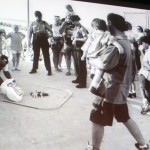As you might have taken notice, this month marks a kind of new resolution in the SWITCH Journal. After more than a decade major changes are a foot and I am considering a resolution of my own, a new start that is inspired by Steve Kurtz’s Autumn lecture at University of California Berkeley. In this review Kurtz’s lecture, I am asking for an absolution. I beg your indulgence, dear reader, I have to confess that: Steve Kurtz makes me feel like a tool. A tool of economic systems, employment, religion, the market, and that amazingly hegemonic institution of education. I am without a doubt quite infatuated with the systems of civilization and the rule sets which constructs it. Academia’s model has led me to apprentice under many very influential and knowledgeable mentors. The benefit, of course, is that the model has led me to apprentice under many very influential and knowledgable mentors and has allowed me to become conversant with the professional practices I am pursuing. Looking critically at authoritarian structure, I have always seen that my participation as an excellent opportunity to learn, a didactic moment where I can fully engage and voice my politics (if you want to be smart, hang out with people smarter than you). Kurtz’s discussions about the micro-fascisms that can develop from losing perspective through this practice have created a small crisis and re-evaluation of these beliefs.
Many of my left leaning colleagues can tell you what a shill I can be. Such as the way I stood up at a national arts conference and pre-ambled “I am here to defend the market…” in response to a particularly acrimonious and vicious critique of the excesses of industry and business. And I have debated countless times that the culture of the arts has an automatic and reactionary mistrust of dominant culture directly founded in the Modernist traditions without a truly critical update for this century. And yet I cannot help but feel puny and complicit in seeing the ramifications of Kurtz’s experiences in stepping slightly outside norm.
Kurtz did not immediately cut to his very well-known saga with the NSA and the Attorney General’s office. Instead, Kurtz started by exploring a lineage of his projects that interrogated the edges of the very narrow strip of ‘acceptable behavior’. He brought to light the Foucaultian ideas of the internalized control mechanisms known as micro-fascisms; Kurtz made quite a good case about the tragedy in self-regulation: a tragedy of self-censorship in order to continue to interface the invisible mechanisms that hold society together.
Stepping over the boundary is really easy, Kurtz contends. And he demonstrated that it doesn’t take much more than an adult man playing with Hot Wheels toy cars on a city sidewalk to elicit an immediate sanction by law enforcement officers. The execution of swift sanctions by the military, police, politics, and the economy against those who step over the border of the hegemony can quickly train the ‘good citizen’. This conditioning can become engrained very quickly because of course the sanction usually leads to a loss or exclusion from the beneficial attributes of belonging to society.
Thus an internalization of the ‘power’ becomes a selfish survival mechanism that also has a chilling effect on our creativity and freedom: an internal dialogue in which we can limit our own exploration of our discipline. Kurtz told a story about one of his travels in Europe; he had identified the perfect location to site his performance: a tower in the city center and connected with the city government. Immediately, he thought his project, using the tower to release microbes, was an outrageous request and had decided not to pursue it. Within his own mind a small fascist voice said “They’ll never let you do that.” Luckily, the curator assured Kurtz that they should try. The city council did approve it because, they were approached reasonably and understood that it was an artist performance. This is the internalized voice of authority and we can hear it say, “We can’t ask for that! They will never let us into city hall.”
The automatic silence of the creative, critical, and vital voice by these internal dialogues is tragic; it is a paralysis of creativity.
“It doesn’t have to be some kind of radical speech, it can be something very simple like we apologize for the sewage flowing around in the harbor.”
Kurtz posited that the spectrum of acceptable behavior is narrowing and is continuing to do so. The rise in fundamentalist sentiment since 2001 is not just confined to religious organizations. The fear of the ‘unknown’ has created ludicrous reactions in secular government as well. Loosely written and even more loosely interpreted acts such as the ‘Patriot Act’ threaten all of our freedoms. The threat is not limited to the novice practitioners like myself. You might have more than a decade of published work using biology and still be detained by the FBI and charged with ‘bioterrorism’ and threatened with twenty years in prison. A reification of the micro-fascisms; another lesson in how to be ‘the good citizen’.
And so I confess to you, the readers and the artists. I am guilty of silencing myself when I should have spoken my mind. I am guilty of asking permission. I am guilty of not asking permission because it was an outlandish idea. I am guilty of fearing to place an electronic device in public.
It has never been more important to teach critical thought. It has never been more important to practice critically. For my absolution, I promise to play with toy cars on the sidewalk in front of Starbuck’s and release mists from the highest balconies at San Jose State, and leave little mysterious gadgets on the local bus. Please tell me what you will do.
My apologies,
Thomas Asmuth
p.s.
Steve Kurtz’s lecture at ATC can be watched in it’s entirety at: http://bampfa.berkeley.edu/podcasts/atc/kurtz
- photo courtesy of Eileen Chen
- photo courtesey of Eileen Chen

